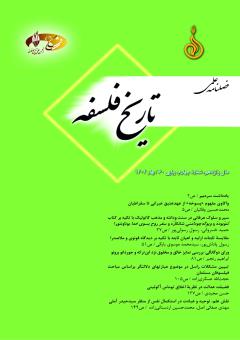واکاوی مفهوم «پسوخه» از عهدعتیق عبرانی تا سقراطیان
محورهای موضوعی : ریشهشناسی مکاتب و آراء فلسفی در ادوار قدیم و جدید
1 - استادیار گروه مطالعات علم و فناوری، دانشگاه امیرکبیر، تهران، ایران
کلید واژه: پسوخه, عهد عتیق, هومر, فیزیولوگی, فیثاغوریان,
چکیده مقاله :
پسوخه یا نفس، از موضوعات فکری مهم نزد فیلسوفان یونانی، بویژه سقراط، افلاطون و ارسطوست و نزد آنهاست که مسئلۀ نفس بتدریج شاکله و صورتبندی فلسفی خود را پیدا میکند. اما ایدههای فلسفی در خلأ نمیروید و فهم این فیلسوفان از مفهوم «پسوخه» یا «نفس» بسیار متأثر از اندیشه پیشینیان و یونان باستان است. مفهوم پسوخه پیش از آنکه در دستان سقراط قرار گیرد، تطوری تاریخی را در یونان تجربه کرده، از شاعرانی همچون هومر و ایدههای دینیِ عهد عتیق گرفته تا فیزیولوگها؛ فلاسفۀ متأخر یونانی با انباشتی از ایدهها و تحولات آنها در مفهوم پسوخه، با آن مواجه شدند. جستار پیش رو درصدد است با تحلیل مواضع متعدد از فقرات عهد عتیق، تلقیهای هومر، و سپس دیدگاههای متفاوت فیزیولوگها و فیلسوفان پیش از سقراط، تطور مفهومی «پسوخه» را در این بازۀ تاریخی واکاوی نموده و سیر شکلگیری این ایده را تبیین نماید. در این مسیر، ناگزیر به بررسی خانوادهیی از مفاهیمِ مرتبط با ایدۀ نفس، بویژه مفاهیمی همچون نوس میپردازیم و سعی داریم فهمی منسجم از مسیر تطوّر این ایده بدست دهیم.
Psyche or the soul was one of the important philosophical topics for Greek philosophers, especially Socrates, Plato, and Aristotle, and it is with them that the problem of the soul gradually developed its philosophical structure and formulation. However, philosophical ideas do not emerge in a vacuum, and these philosophers’ understanding of the concept of “psyche” or the “soul” was greatly influenced by the thoughts of their predecessors and ancient Greek philosophers. Before being tackled by Socrates, the concept of psyche experienced a historical evolution in Greece in the works of poets such as Homer, among the religious ideas of the Old Testament, and in theories of physiologists. Later Greek philosophers encountered it with the support of an abundance of ideas and the related developments. The present study aims to analyze the conceptual evolution of “psyche” in this historical period by examining multiple positions reflected in different sources from passages in the Old Testament, Homer’s interpretations, and then the different views of physiologists and pre-Socratic philosophers and to explain the formation process of this idea. In doing so, the author is compelled to examine a family of concepts related to the idea of the soul, particularly concepts such as nous in order to provide a coherent understanding of development of this idea.
ابنعربی، محمدبنعلی (1370) فصوصالحکم، تهران: الزهرا.
اروین، ترنس (1399) اندیشه در دورۀ میانه، ترجمۀ حسن فتحی، تهران: سمت.
استیس، والتر ترنس (1397) تاریخ انتقادی فلسفه یونان، ترجمۀ یوسف شاقول، قم: دانشگاه مفید.
تسلر، ادوارد (1401) کلیات تاریخ فلسفه یونان، ترجمۀ حسن فتحی، تهران: نشر حکمت.
خراسانی (شرف)، شرفالدین (1350) نخستین فیلسوفان یونان، تهران: علمی و فرهنگی.
شندلباخ، هربرت (1398) تاریخ و تبیین مفهوم خرد، ترجمۀ رحمان افشاری، تهران: مهراندیش.
فلاطوری، عبدالجواد (1394) دگرگونی بنیادی فلسفۀ یونان در برخورد با شیوۀ اندیشۀ اسلامی، ترجمۀ محمدباقر تلغریزاده، تهران: مؤسسه حکمت و فلسفه ایران.
قیصری، داود (1375) شرح فصوصالحکم، تهران: علمی و فرهنگی.
کاپلستون، فردریک چارلز (1388) تاریخ فلسفه، ج1، ترجمۀ جلالالدین مجتبوی، تهران: سروش و علمی و فرهنگی.
لیندبرگ، دیوید (1396) سرآغازهای علم در غرب، ترجمۀ فریدون درهبیدی، تهران: علمی و فرهنگی.
مجلسی، محمدباقر (1403ق) بحار الانوار، بیروت: مؤسسة الوفاء
نوسبام، مارتا (1389) ارسطو، ترجمۀ عزتالله فودلادوند، تهران: طرح نو.
وکیلی، شروین (1399) افلاطون، واسازی یک افسانه، تهران: نشر ثالث.
هایدگر، مارتین (1401) پارمنیدس، ترجمۀ طالب جابری، تهران: سمت.
یگر، ورنر (1392) الهیات نخستین فیلسوفان یونان، ترجمه فریده فرنودفر، تهران: حکمت.
Aristotle. (2010). De Anima. trans. by M. Shiffman. Newburyport, MA: Focus Publishing.
Bauks, M. (2016). “Soul-Concepts” in Ancient Near Eastern Mythical Texts and Their Implications for the Primeval History. Vetus Testamentum, vol. 66, no. 2, pp. 181-193. doi:10.1163/15685330-12301251
Bremmer, J. (1983). The Early Greek Concept of the Soul. Princeton, NJ: Princeton University Press.
Crombie, I. M. (2013). An Examination of Plato’s Doctrines. London: Routledge & Kegan Paul.
Eichrodt, W. (1967). Theology of the Old Testament. Vol. II. London: SCM Press.
Glasson, T. F. (1952). Heraclitus' Alleged Logos Doctrine. The Journal of Theological Studies, vol. 3, no. 2, pp. 231-238. doi: 10.1093/jts/III.2.231
Granger, H. (1996). Aristotle’s Idea of the Soul. Dordrecht: Kluwer Academic Publishers.
Guthrie, W. K. C. (1962). A History of Greek Philosophy. vol. 2. Cambridge: Cambridge University Press.
Lind, R. E. (2001). Historical origins of the modern mind/body split. The Journal of Mind and Behavior, vol. 22, no. 1, pp. 23-40.
MacDonald, P. S. (2017). History of the Concept of Mind. vol. 1. London: Routledge.
Miller, E. L. (1981). The Logos of Heraclitus: Updating the Report. The Harvard Theological Review, vol. 74, no. 2, pp. 141–159.
Murphy, N. (2006). Bodies and Souls, or Spirited Bodies? Cambridge: Cambridge University Press.
Onians, R. B. (1951). The Origins of European Thought. (2nd ed.). Cambridge: Cambridge University Press.
Snell, B. (1953). Homer’s View of Man. in The Discovery of the Mind. trans. by T. G. Rosenmeyer, Oxford: Blackwell, pp. 1-22.
Wolff, H. W. (1974). Anthropology of the Old Testament. London: SCM Press.

